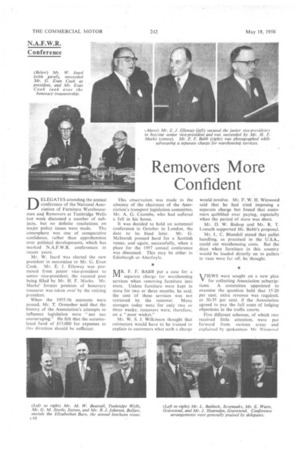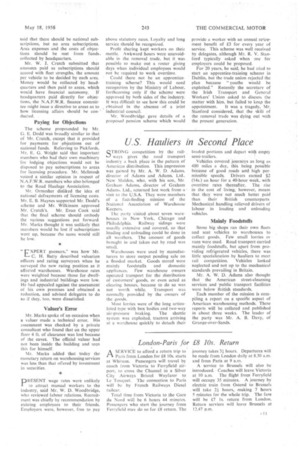Removers More Confident
Page 50

Page 51

If you've noticed an error in this article please click here to report it so we can fix it.
DELEGATES attending the annual conference of the National Association of Furniture Warehousemen and Removers at Tunbridge Wells last week discussed a number of subjects, but no definite resolutions on major policy issues were made. The atmosphere was one of comparative confidence, rather than apprehension over political developments, which has marked N.A.F.W.R. conferences in recent years.
Mr. W. Isard was elected the new president in succession to Mr. G. Evan Cook. Mr. E. J. Elloway was promoted from junior vice-president to senior vice-president, the vacated post being filled by Mr. H. F. Marks. Mr. Marks' ' former position of honorary treasurer was taken overby the retiring president.
When the 1955-56 accounts were passed, Mr. T. Ormesher said that the history of the Association's attempts to influence legislation were "not too encouraging." He felt that the accumulated fund of £15,000 for expenses in this direction should be sufficient. This observation was made in the absence of the chairman of the Association's transport legislation committee. Mr. A. G. Coombe, who had suffered a fall in his home.
It was decided to hold an autumnal conference in October in London, the date to be fixed later. Mr. G. McIntosh pressed hard for a Scottish venue, and again, successfully, when a place for the 1957 annual conference was discussed. This may be either in Edinburgh or Aberfoyle.
MR. F. F. BABB put a case for a separate charge for warehousing services when removing furniture into store. Unless furniture were kept in store for two or three months, he said, the cost of these services was not retrieved by the remover. Many storages today were for only two or three weeks: removers were, therefore, on a "poor wicket."
Mr. W. S. J. Wilkinson thought that estimators would have to he trained to explain to customers what such a charge would involve. Mr. F. W. H. Winwood said that he had tried imposing a separate charge but found that customers quibbled over paying, especially when the period of store was short.
Mr. D. W. Bishop and Mr. R. T. Lomath supported Mr. Babb's proposal.
Mr. L. C. Blundell stated that pallet handling, as practised in the U.S.A., could cut warehousing costs. But the days when furniture in this country would be loaded directly on to pallets in vans were far off, he thought.
VIEWS were sought on a new plan for collecting Association subscriptions. A committee appointed to examine the question held that 15-20 per cent, extra revenue was required, or 30-35 per cent. if the Association agreed to pay the full costs of lodging objections in the traffic courts.
Five different schemes, of which two received little attention, were put forward from various areas and explained by spokesmen Mr. Winwood said that there should be national subscriptions, but no area subscriptions. Area expenses and the costs of objections should be met from funds. collected by headquarters. , Mr. W. I. Crutch submitted that amounts paid as subscriptions should accord with fleet strengths, the amount per vehicle to be decided by each area. Money would be collected by headquarters and then paid to areas, which would have financial autonomy. If headquarters paid directly for objections, the N.A.F.W.R. finance committee might issue a directive to areas as to how licensing affairs should he conducted.
Paying for Objections
The scheme propounded by Mr. G. E. Dodd was broadly similar to that of Mr. Crutch, except that it provided for payments for objections out of national funds. Referring to Pickfords, Mr. E. G. Wright said that important members who had their own machinery for lodging objections would not be disposed to pay subscriptions to areas for licensing procedure. Mr. McIntosh voiced a similar opinion in respect of N.A.F.W.R. members who also belonged to the Road Haulage Association.
Mr. Ormesher disliked the idea of national defrayrnents of licensing costs. Mr. E. B. Haynes supported Mr. Dodd's scheme and Mr. Wilkinson approved Mr. Crutch's. Mr. Evan Cook said that the final scheme should embody the various suggestions put forward. Mr. Marks thought it was unlikely that members would be lost if subscriptions went up, because the sums would still be low.
" XPERT guessers," was how Mr.
C. H. Batty described valuation officers and rating surveyors when he surveyed the new rating position as it affected warehouses. Warehouse rates were weighted because those for dwellings and industrial buildings were low. He had appealed against the assessment of his own premises and obtained a reduction, and advised delegates to do so if they, too, were dissatisfied.
Valuer's Error
Mr. Marks spoke of an occasion when a valuer made a technical error. His assessment was checked by a private consultant who found that on the upper floor 4 ft. of clearance was lost because of the eaves. The official valuer had not been inside the building and seen this for himself.
Mr. Marks added that today the monetary return on warehousing services was less than that offered by investment in securities.
pRESENT wage rates were unlikely to attract manual workers. to the industry, said Mr. W. D. Woodbridge, who reviewed labour relations. Recruitment was chiefly by recommendation by existing employees to their friends. Employers were, however, free to pay
above statutory rates. Loyalty and long service should be recognized.
Profit sharing kept workers on their mettle. Awkward hours were unavoidable in the removal trade, but it was possible to make out a roster giving days when individual employees would not be required to work overtime.
Could there not be an apprentice. training scheme? This would need recognition by the Ministry of Labour. forthcoming only if the scheme were approved by both sides of the industry. It was difficult to see how this could be obtained in the absence . of a joint industrial council. _ Mr. Woodbridge gave details of a proposed pension scheme which would provide a worker with an annual retirement benefit of E3 for every year of service. This scheme was well received by delegates, although Mr. R. V. Stanford typically asked when one for employers could be proposed.
For 20 years, he said, he had tried to start an apprentice-training scheme in Dublin, but the trade union rejected the plan because "youths would he exploited." Recently the secretary of the Irish Transport and General Workers' Union asked to discuss the matter with him, but failed to keep the appointment. It was a tragedy, Mr. Stanford considered, that the skit] of the removal trade was dying out with the present generation.
















































































































